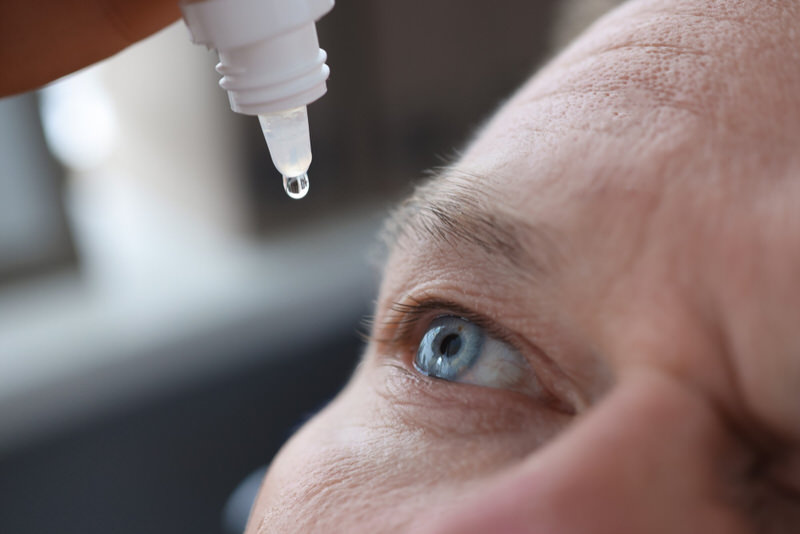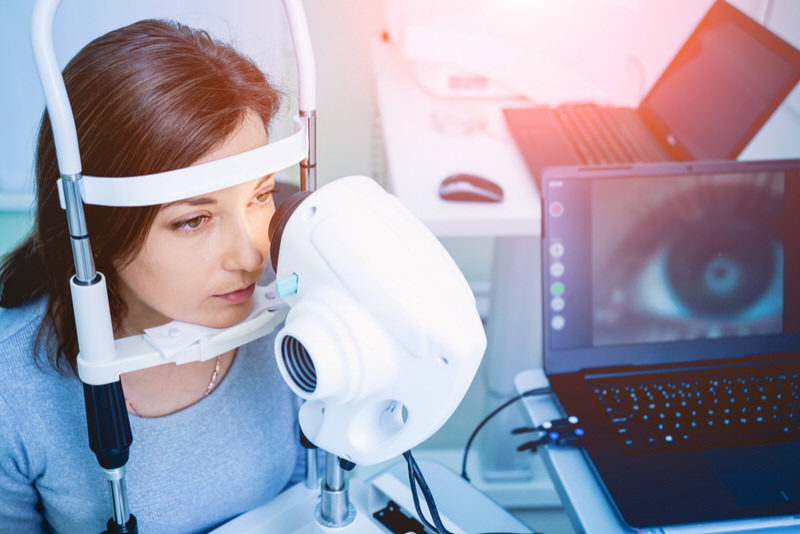Seeing darker from one eye could be a potential symptom of vision loss. Anything from the cornea to the retina or the optic nerve can lead to darkening vision if you’re facing this issue. It could be caused due to a medical condition or an injury received to the eye. Different kinds of vision loss depend on your particular case. Some causes of gradual vision loss include macular degeneration, amblyopia, cataracts, or glaucoma. Some reasons for sudden vision loss include migraine, detached retina, black eye, or corneal abrasion. It’s better to visit a doctor right away to get a correct diagnosis done and receive proper treatment before things get worse.
For eyes to be functioning correctly, both of them should receive light, which then directs to the retina. The retina transfers data to the optic nerve works with the brain to turn the data into visuals that you can see with your eyes.
While this is the whole process, if recently you’ve been having some issues with your vision in one eye, there might be a problem with it.
Dim vision and seeing darker in one eye aren’t normal compared to your other eye. If you’ve been facing this issue for some time now, you might want to know what could be the reason behind it.
So, what steps should you take? Let’s look at the symptoms and possible causes of this issue and how it’s related to loss of vision.
How do our eyes work?
Knowing how our eyes work is essential before jumping into potential causes for a darkened vision.
Light enters through the cornea, passes through the pupil, and reflects off of the lens. This reflection is picked up by the retina and transferred to the optic nerve, which transmits visual signals to the brain.
Our two eyes work together to create a cohesive singular picture as we view the world. When vision changes impact one eye, it can distort the image making it more difficult to see clearly.
If you’re facing problems with your vision, such as seeing darker from one eye, then anything from the cornea to the retina or the optic nerve can lead to darkening vision.
Reason why you see darker in one eye
Seeing darker from one eye doesn’t happen overnight and is gradual. The signs and symptoms are always present initially, but most people ignore them, which later becomes a severe issue.
According to the Centers for Disease Control and Prevention (CDC), vision problems are among the top 10 disabilities in adults and most prevalent disabilities in children.
When you notice a difference in what you see from both your eyes, and if you feel one eyesight is usually darker than the other, it could be a sign of vision loss. In vision loss, too, there’re different kinds of it.
- Central vision loss (affects the center of a person’s vision)
- Peripheral vision loss (affects the edges of vision)
- Total vision loss
- Night blindness (trouble seeing in low light)
- Blurry, hazy, or out of focus vision
- Difficulty in seeing shapes or only seeing shadows
Causes of gradual vision loss
Hearing the word vision loss makes us fear the worst of the situation, but it depends on different causes. Each type of vision loss has different treatments to cope with it.
In some cases, you’re facing a gradual vision loss due to old age or a medical condition. In any case, there’s still a possibility to avoid complete vision loss by various treatments.
Age-related macular degeneration (AMD)
AMD is an eye disease that might worsen over time, and it’s the leading cause of severe, permanent vision in people over age 60. Since this disease happens as you get older, it doesn’t cause blindness immediately but causes severe vision problems.
It happens when the small central portion of your retina, called the macula, wears down. The retina is the light-sensing nerve tissue at the back of your eye.
Treatment can slow the condition or make it less severe.
Amblyopia
When a person suffers from amblyopia (a type of poor vision), the brain focuses on one eye more than the other, virtually ignoring the lazy eye. If that eye does not receive proper stimulation, the nerve cells responsible for vision don’t mature as they should.
- Symptoms include blurred vision and poor depth reception
- Those suffering from it need to know it’s a connection problem between the eye and brain and not the eye itself.
- It can be caused due to a muscle imbalance or eye disease
- Treatment can be effective, and the sooner it begins, the better it is.
If treatment isn’t started within the right time, it might cause vision loss, so using corrective devices such as glasses or surgery are some options people choose from.
Cataracts
Cataracts cause more vision problems globally than any other eye condition or disease. It causes a part of the lens to become opaque or cloudy, light doesn’t pass through easily, and vision becomes blurry like looking through a fogged-up window.
The cloudier your vision gradually gets, the worse your vision will be, and it is quite a common eye condition. Surgery is the primary treatment for this particular issue.
Glaucoma
Glaucoma refers to a build-up of pressure within the eye that causes damage to the optic nerve located in the back of the eye. It starts with seeing darker in one eye, leading to slowly losing one’s vision.
The symptoms are pretty gradual, and only when one carefully monitors their body will they notice something’s not right with their eye.

For glaucoma, prescription eye drops are the primary treatment. By lowering the pressure in the eye, eye drops can prevent further damage to the optic nerve. It’s important to catch it when you sense glaucoma developing to prevent complete vision loss.
However, you can’t reverse the damage already caused.
Causes of sudden vision loss
Sometimes, it doesn’t take too long to detect seeing darker from one eye to convert into complete vision loss, and it can happen over a few seconds or minutes to a few days. That’s’ why it’s essential to visit a doctor as soon as possible when you notice some vision problem.
Complete vision loss might occur due to the following possible causes:
Migraine
Although migraine is associated with having severe headaches, it affects differently to people in different ways, and the triggers, severity, symptoms, and frequency can vary.
Migraine can also cause visual symptoms known as migraine aura. The typical migraine visual effects involve an area that a person cannot see clearly, and it typically happens in the early stages of a migraine episode.
The typical visual disturbances include:
- Seeing strange, sparkling, or flashing lights that aren’t there
- Seeing zig-zagging lines of light
- Having blind spots or blank patches in the field of vision
- Having a pins and needles sensation in an arm or leg
- Seeing things aren’t there out of one eye, such as transparent strings of objects
- Not being able to see part of something clearly
- Having part of the field of vision disappear, then reappear
This visual aura can be described as a very bright camera flash, but the visible changes may last for several minutes to one hour. Avoiding bright light and loud sounds and taking migraine medication can ease the symptoms.
Detached retina
Another reason for witnessing darker vision from one eye could be the detached retina. It’s when the retina lifts away from the back of the eye, and it can cause a total or partial loss of vision in the affected eye.
If you’re suffering from this particular issue, you’ll feel as if something blocking a part of your vision or vision might seem darker as compared to another eye. A detached retina is quite a serious issue and can cause permanent vision loss if left untreated.
Treatment involves surgery depending on what the doctor suggests to the person suffering from it.
Black eye
Someone who recently received a black eye might also lose their vision. A black eye means there’s a bruising of the tissue under the skin around the eye.
It can easily affect your vision as it’s basically an eye injury. There’s no knowing how much damage the eye has received, and it’s better to get it checked if you see darker from this eye than the other.
Corneal abrasion
Corneal abrasion is a small scratch on the cornea. It depends on your injury, if it’s temporary or permanent, which defines the kind of treatment you’ll be recommended.
Most of these scratches should heal in a couple of days by themselves, and your vision could be back to normal. But if the vision issue persists, it’s better to see a doctor for proper treatment before more damage is done.
When to see the doctor

You should immediately be concerned about seeing a darker vision from one eye. There’s a need to visit the doctor and help find the proper treatment based on the issue. But sometimes, there are other symptoms besides vision issues happening simultaneously, which can be a warning sign:
- Severe headache
- Difficulty speaking
- Facial drooping
- Loss of muscle control on one side of the body
- Severe eye pain
When seeing the above symptoms and vision issues, seeing a doctor right away is the best option. This could be a sign of a stroke or another serious medical condition, and this needs to be tended to right away before you completely lose your vision or face other health issues.
FAQs
Why is my vision in one eye brighter than the other?
There might be a slight difference in your eyes as one sees brighter than the other, and that’s completely normal. It’s about the biology of the receptors in the back of your eye and then the neural pathways that make sense of them.
Slight differences in any one of those areas can cause a tiny difference in color perception. But some medical conditions can bring a sudden change in color perception in one eye. If you see a vast difference in your eyesight, it’s time to consult a doctor.
What is eye stroke?
Eye stroke occurs when there’s a lack of sufficient blood flow to the tissues in the optic nerve’s front part. It can cause sudden vision loss, and other symptoms include loss of visual contrast and light sensitivity.
Although an eye stroke can occur from a total blockage of a blood vessel, it’s more commonly also caused by a lack of pressure or perfusion of the tissue. Stroke can lead to losing vision in one eye, too, which is why if you suddenly start seeing darker in one eye, then immediately visit a doctor.
Most people with eye stroke notice a vision loss in one eye upon waking in the morning with no pain. Some people notice a dark area or shadow in their vision that affects their visual field’s upper or lower half.
What causes a dark shadow in your eye?
If you’ve heard about eye floaters, you must know that they look like black or gray specks, strings, or cobwebs that drift about when you move your eyes and appear to dart away when you try to look at them directly.
These floaters are age-related changes that occur as the jelly-like substance inside your eyes becomes more liquid. These microscopic fibers within the vitreous tend to clump and can cast tiny shadows on your retina. The clouds you see are called floaters.
If there’s a sudden increase of these floaters as your vision becomes more shadowed or cloudy, it’s time to visit the doctor.
How do you know if you’re slowly going blind?
While seeing dark from one eye is just one symptom of going blind, other symptoms might come gradually or slowly:
– Double vision
– Blurry vision
– Seeing flashes of light
– Seeing floaters or spider webs
– Seeing halos or rainbows around lights
– Seeing curtain coming down over one eye
– A sudden decrease in vision
– Sudden sensitivity to light and glare
– Sudden eye pain
– Itching or burning eyes
– Red eyes
– White areas in the pupil
– Changes in the color of your eye
Treatment options can delay the process and preserve your current condition. After diagnosing the cause of your vision loss, the proper treatment can be started effectively.
What are the early warning signs of macular degeneration?
There’re two kinds of macular degeneration, namely dry and wet. Dry is a more common type, and wet degeneration is rare but lethal.
Below are symptoms of dry degeneration:
– Difficulty in adapting to low light levels or needing brighter light when reading or doing close work
– Gradual increase in the haziness of your central or overall vision
– Difficulty in recognizing faces
– A blurred or blind spot in the center of your field of vision
You can see the change in overall eyesight because even if one eye is affected, the other compensates for the weaker eye.
To summarize
When you start noticing your eyesight becoming darker, it’s challenging to come to terms with it and that something might be wrong with your vision. Ignoring your vision issues won’t make it go away, but if you visit a doctor early, these issues can be diagnosed and treated.
There could be various causes behind seeing darker in one eye. It could be due to a medical condition or an injury, but it can lead to vision loss if it starts to become worse. Some issues start with slow vision issues, which, when not treated, will gradually lead to vision loss, and others cause vision quickly.
It could be nothing, but if you ignore it right now, it might become a serious issue later on. Try taking a family member with you to get some support as you get your vision checked and carefully answer the doctor’s questions to receive the correct diagnosis and treatment.


